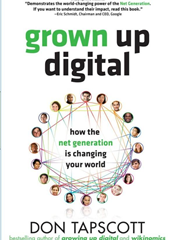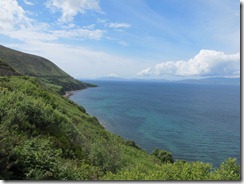 This summer I’ve been reading up on how new technologies are changing the way we learn and live. I’ve been weighing the different viewpoints, from critics who warn of how these new technologies are diminishing certain important capacities (higher order thinking, sustained concentration, social skills, etc.) to those who are more favorable to the sweeping changes and the new opportunities. Here are a few notes from Grown Up Digital: How the Net Generation is Changing Your World by Don Tapscott:
This summer I’ve been reading up on how new technologies are changing the way we learn and live. I’ve been weighing the different viewpoints, from critics who warn of how these new technologies are diminishing certain important capacities (higher order thinking, sustained concentration, social skills, etc.) to those who are more favorable to the sweeping changes and the new opportunities. Here are a few notes from Grown Up Digital: How the Net Generation is Changing Your World by Don Tapscott:
Regarding how we access information, Tapscott says:
The boomers typically go from beginning to end – whether it’s writing an essay, watching The Ed Sullivan Show, or reading the instructions before working the remote control. That’s how boomers, who were raised before Web sites, learned to absorb information. The Net Gener doesn’t operate in this sequential way. Using tools like keywords in Google, hypertext, and ‘clicking, cutting, and pasting,’ today’s young person can search for and organize information containing links to other information. William Winn, director of the Learning Center at the University of Washington, put it this way, children ‘think differently from the rest of us. They develop hypertext minds. They leap around. It’s as though their cognitive structures were parallel, not sequential.’ This is one way that digital immersion has literally rewired brains under 40, Marc Prensky argues in his book Digital Game-Based Learning. (105)
Net Geners who have grown up digital have learned how to read images, like pictures, graphs, and icons. They may be more visual than their parents are. (106)
As boomers, we spent a lot of time hunting for information. We couldn’t always find it – maybe the library was closed on the night we had to finish that essay – so we grew up with a lot less information at hand than the Net Generation has. It made life easier in some ways. It’s easier to jump to a conclusion when you don’t have a lot of information to analyze. The Net Generation has the opposite problem – an avalanche of information coming from an astounding diversity of sources. This presents a real intellectual challenge. (113)





 As a long time aficionado of all things having to do with Mark Twain, and in recognition that we are nearing the centennial of his death (April 21, 2010), I am going to start posting some of my favorite Twain observations and witticisms. As a child growing up Hannibal, MO, I was immersed in the stories and characters that Twain brought to life. As an adult, he continues to be a conversation partner across a broad range of topics.
As a long time aficionado of all things having to do with Mark Twain, and in recognition that we are nearing the centennial of his death (April 21, 2010), I am going to start posting some of my favorite Twain observations and witticisms. As a child growing up Hannibal, MO, I was immersed in the stories and characters that Twain brought to life. As an adult, he continues to be a conversation partner across a broad range of topics. 

